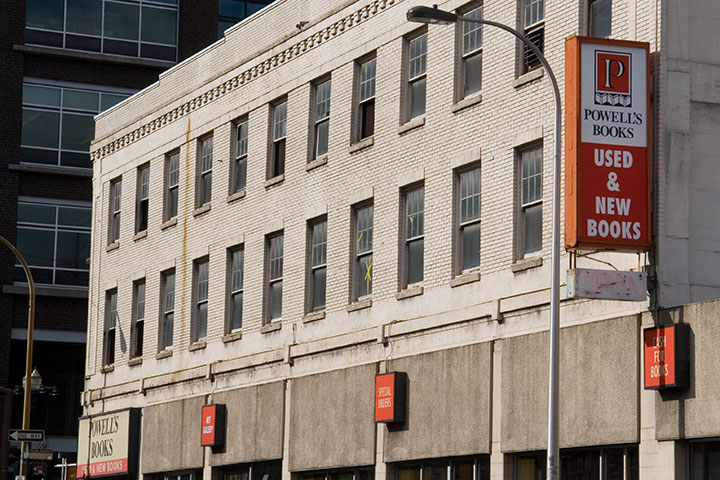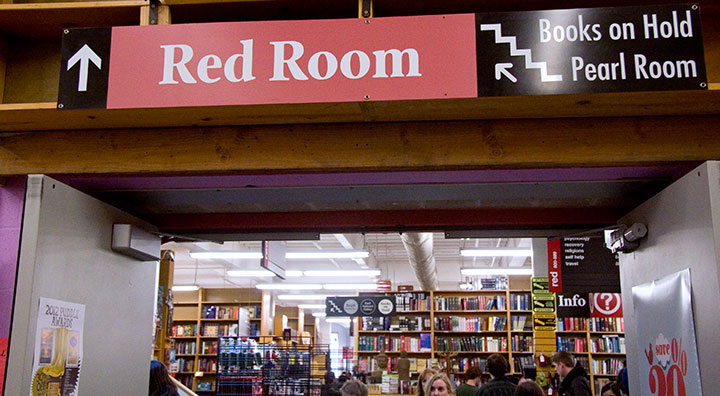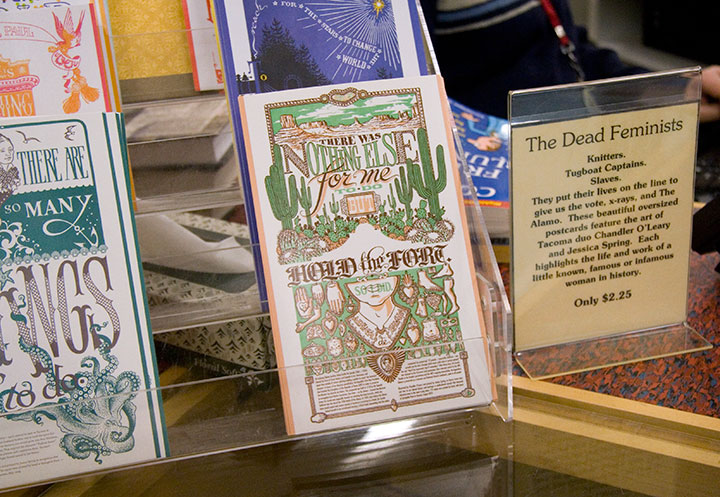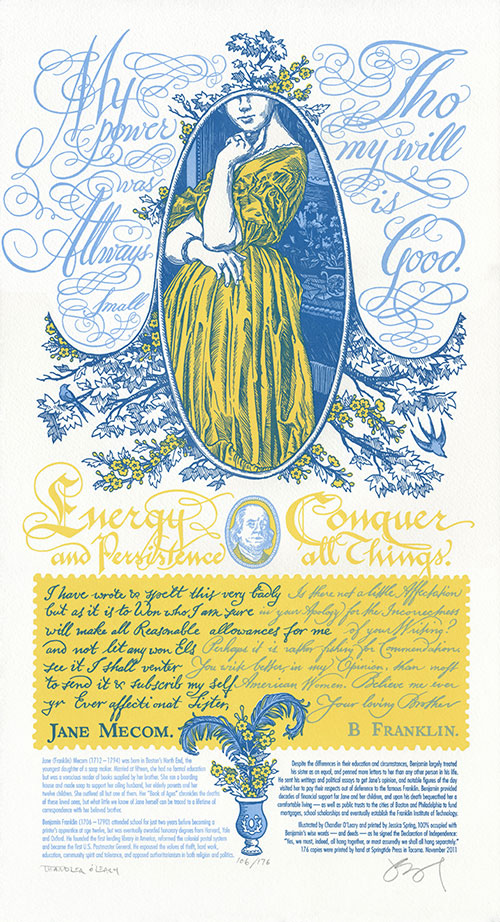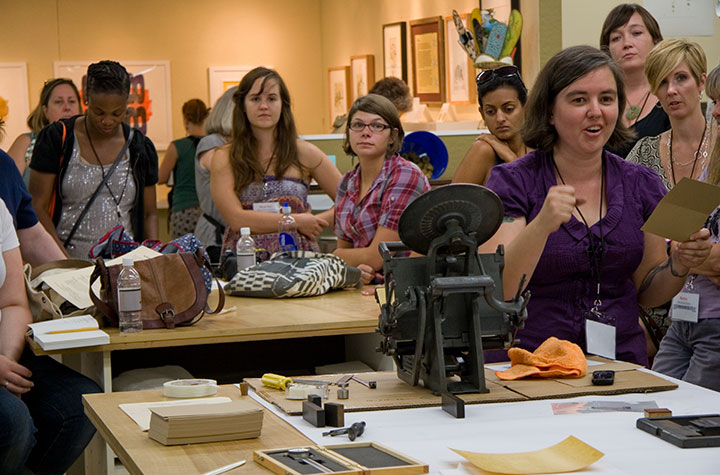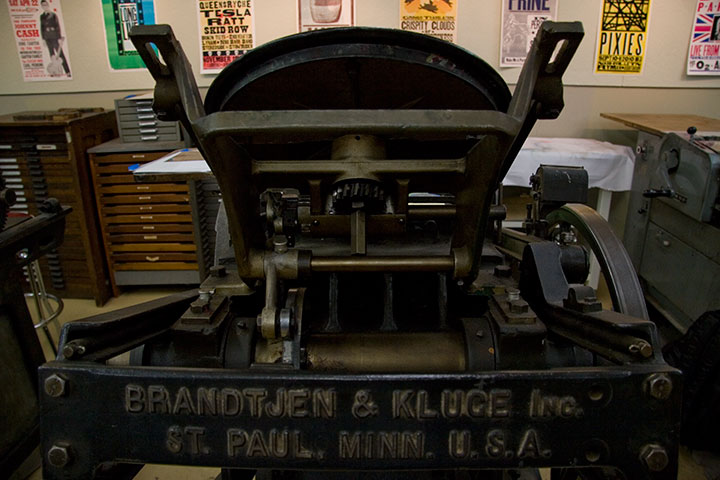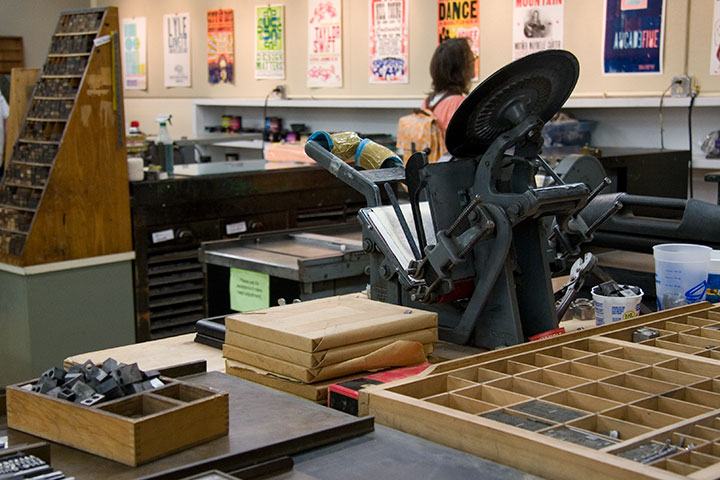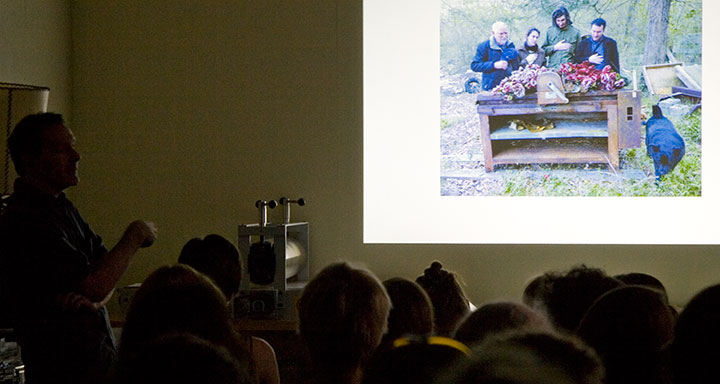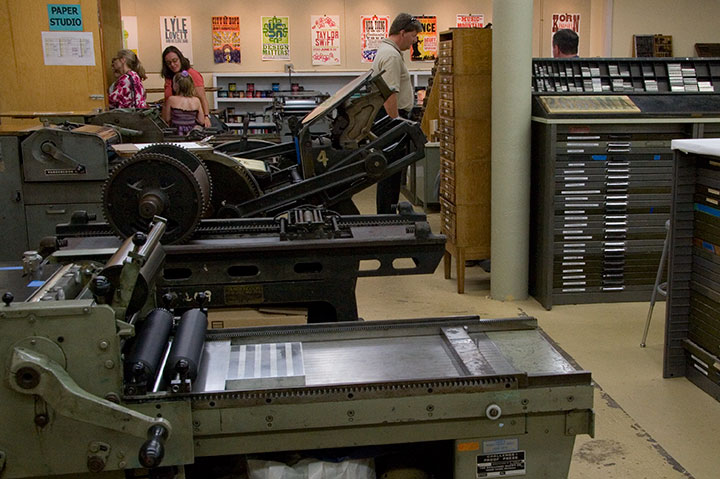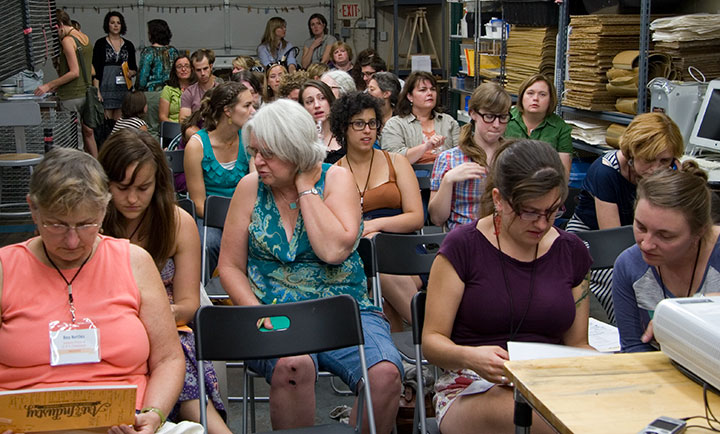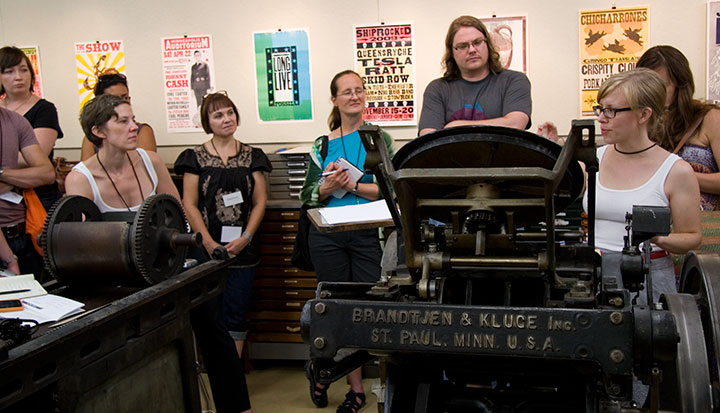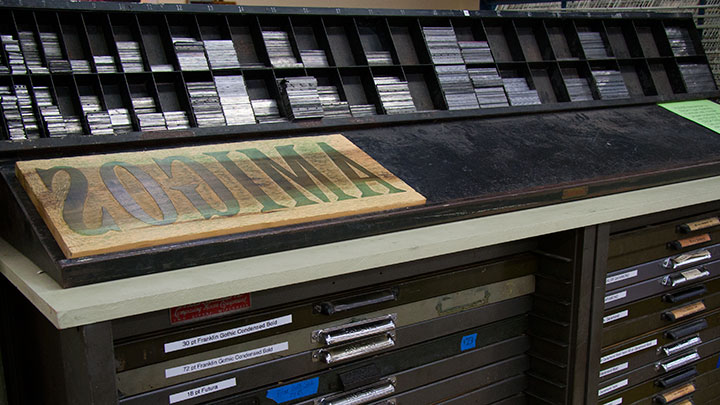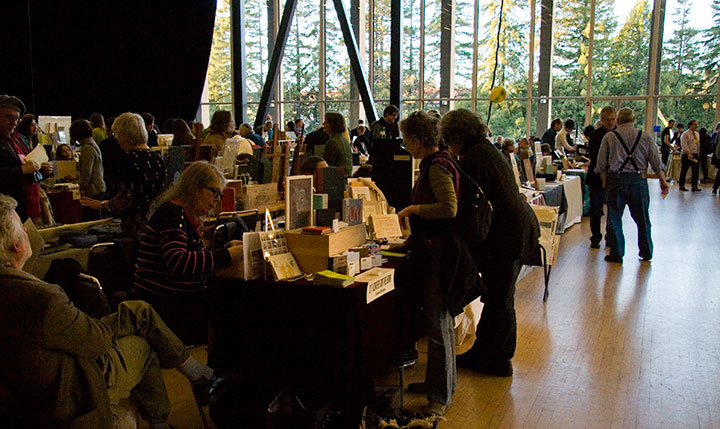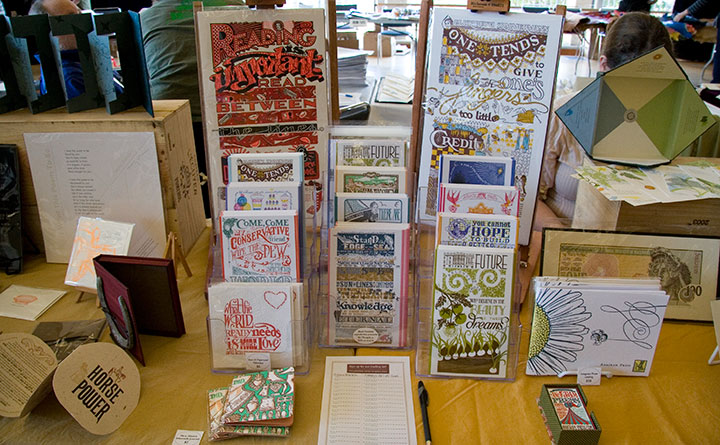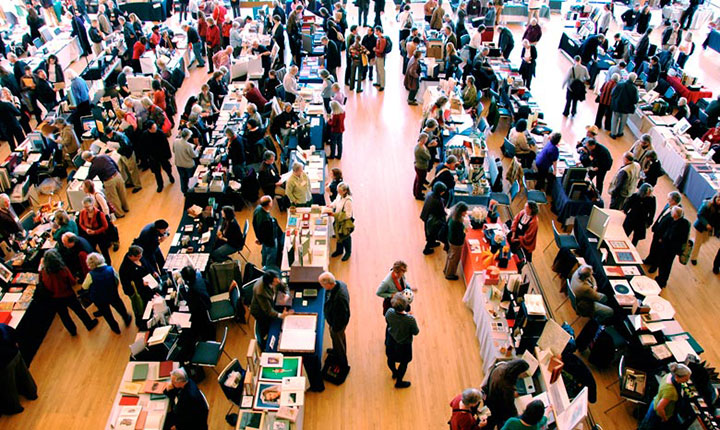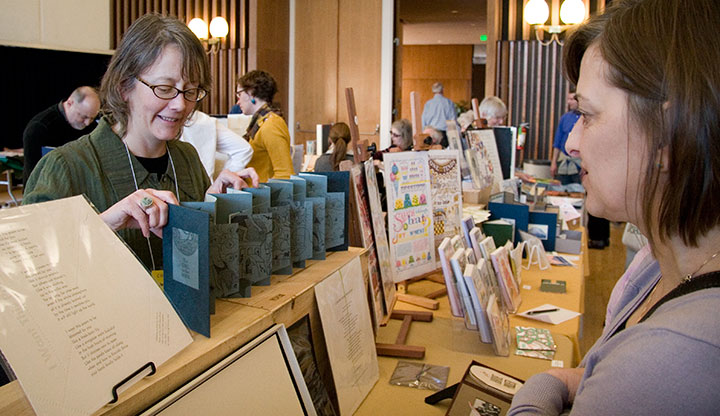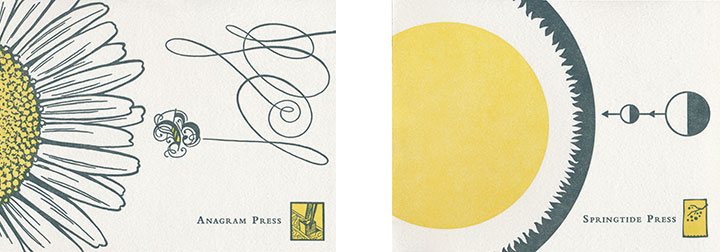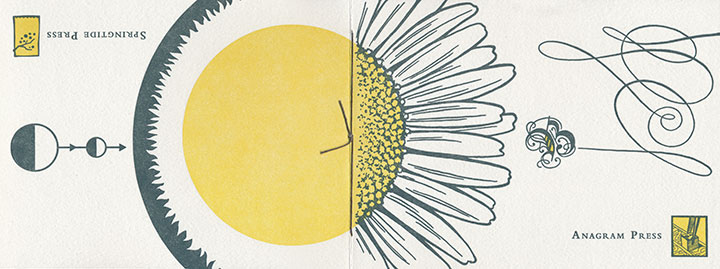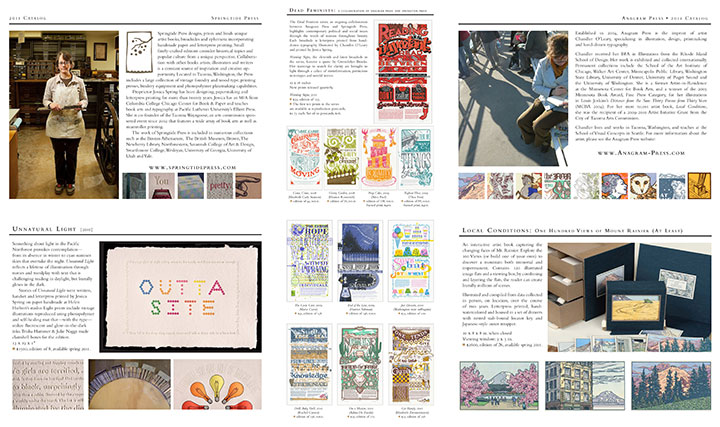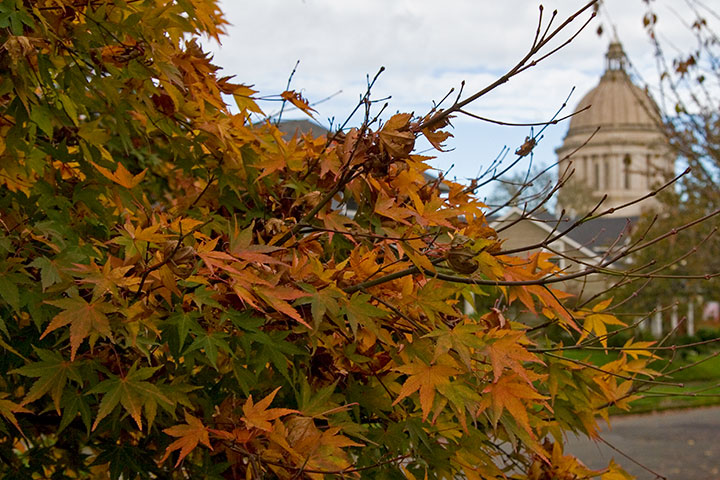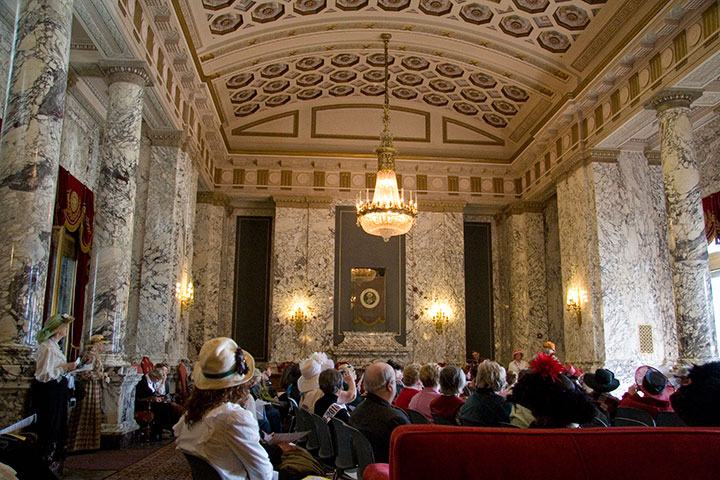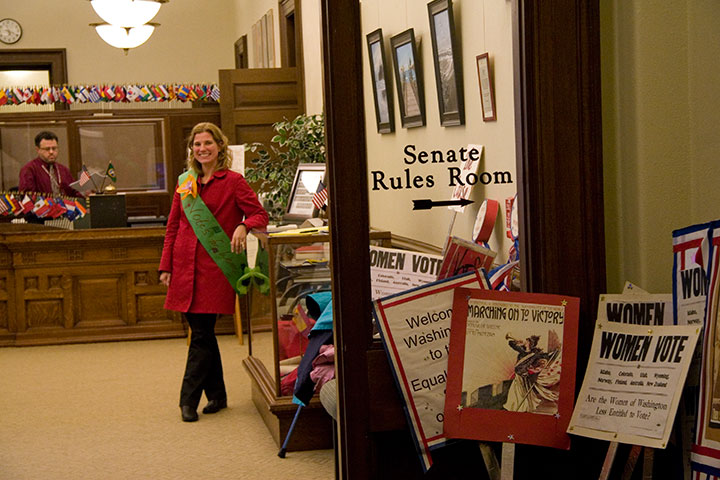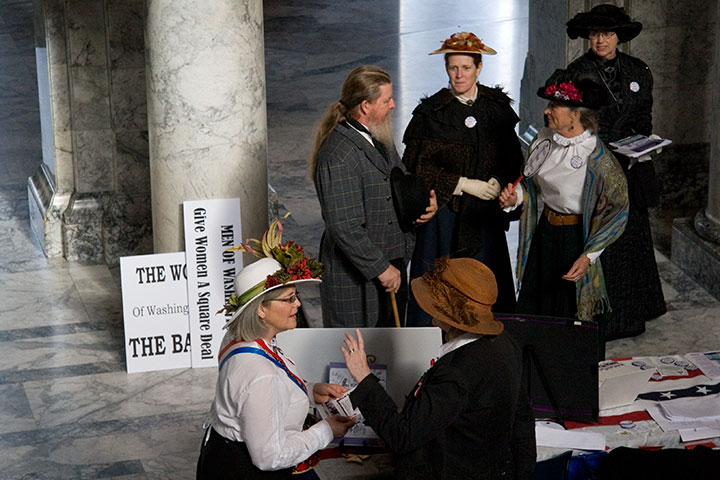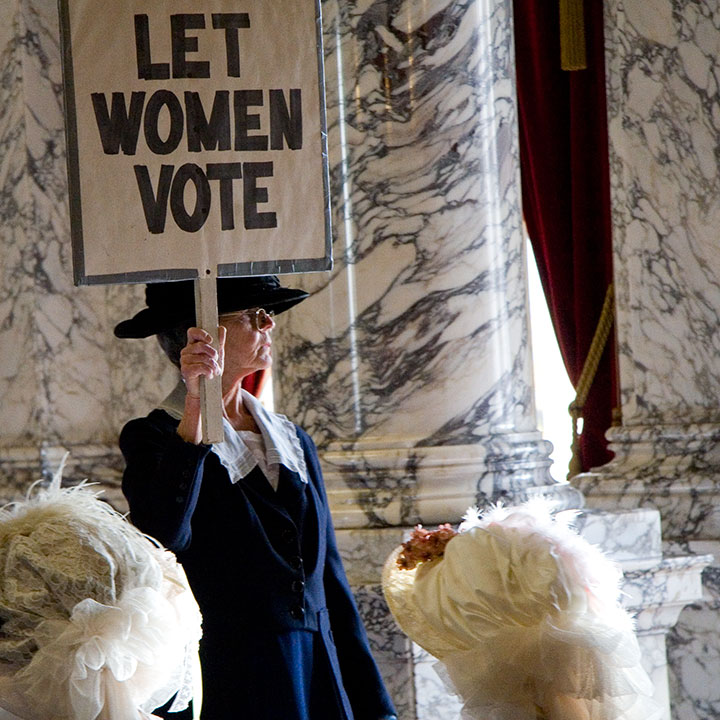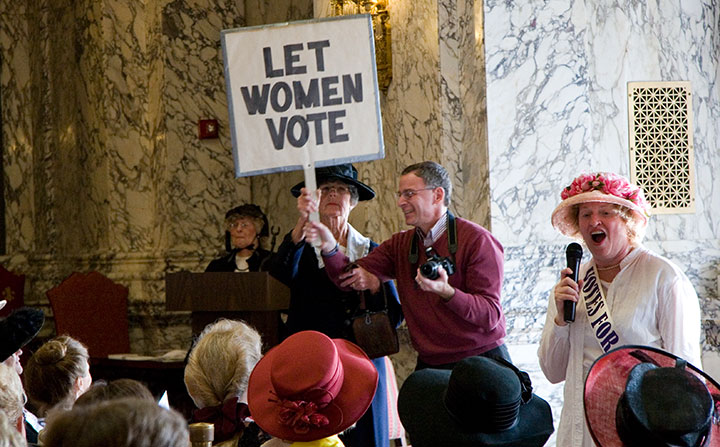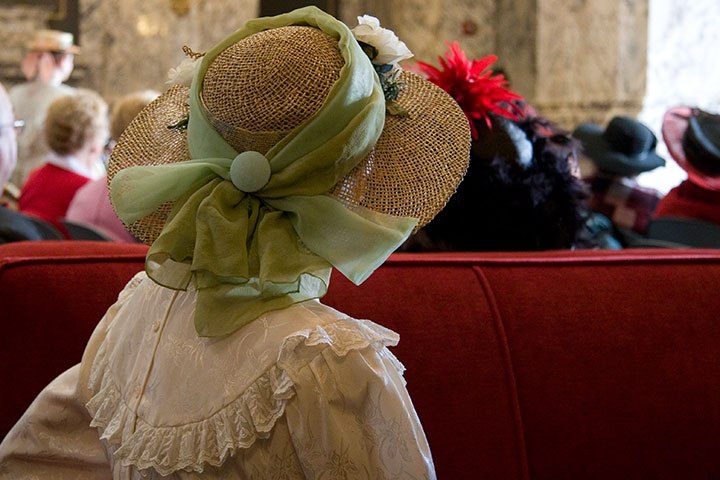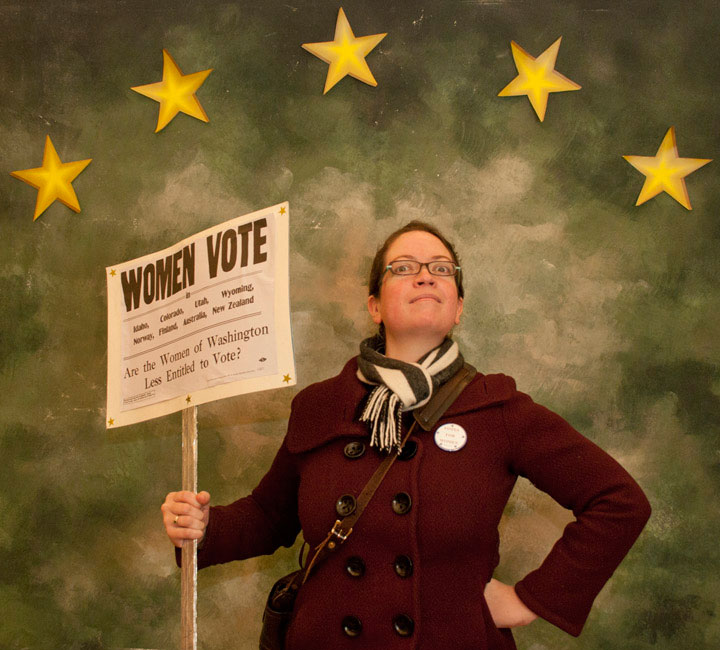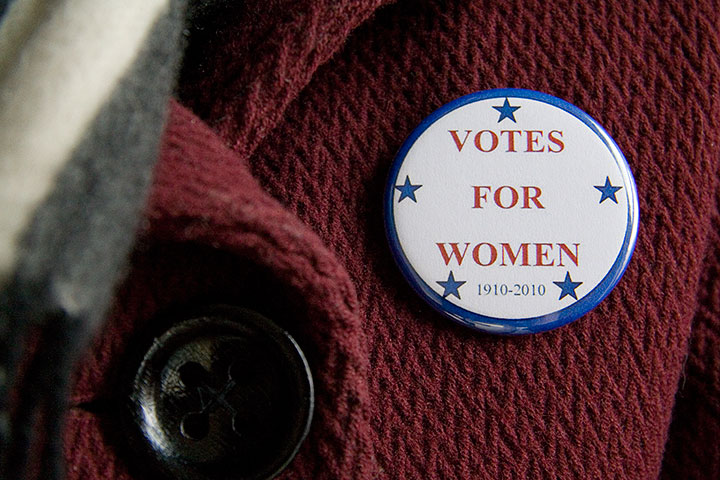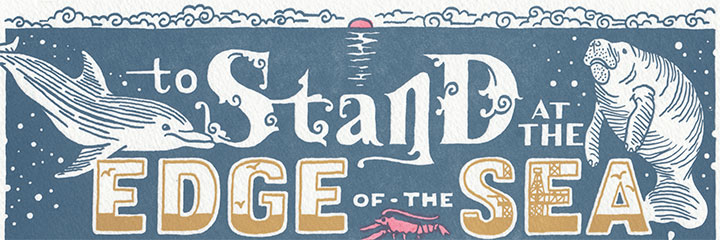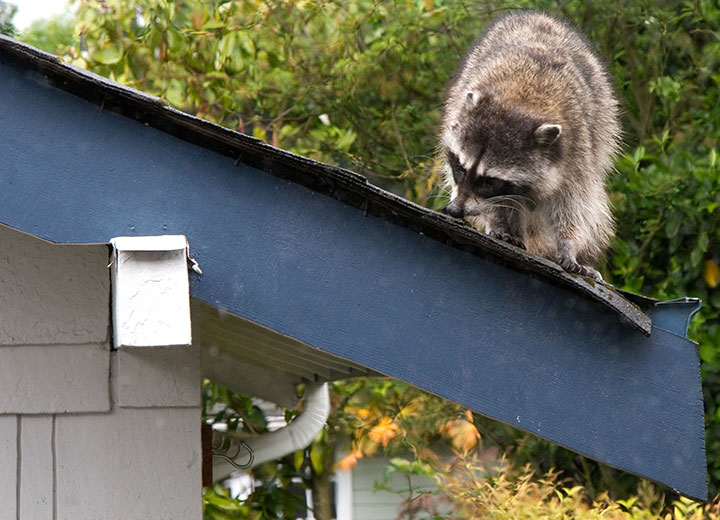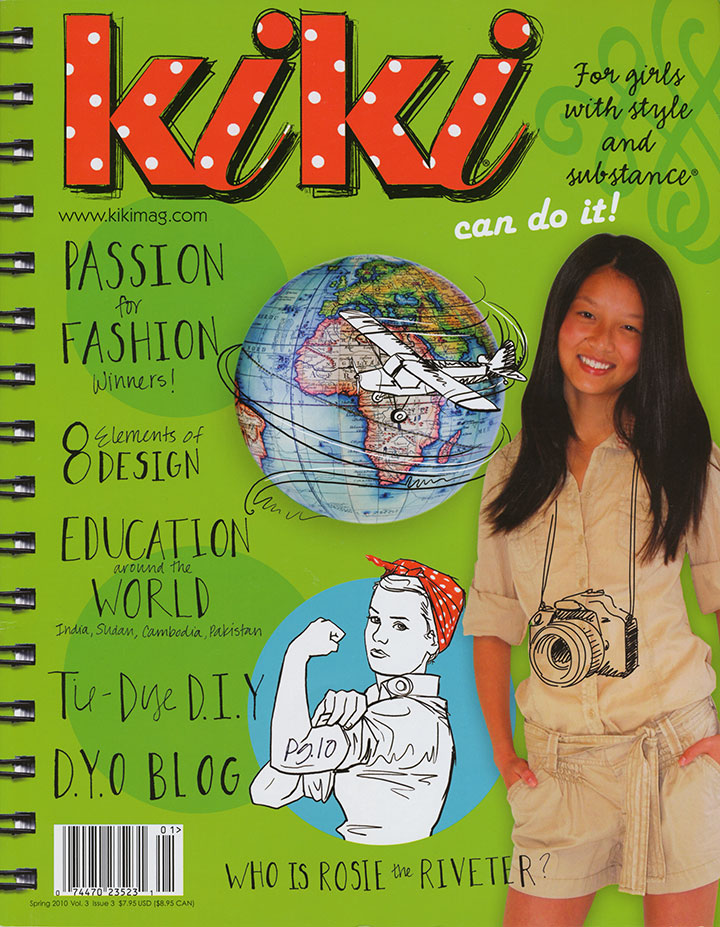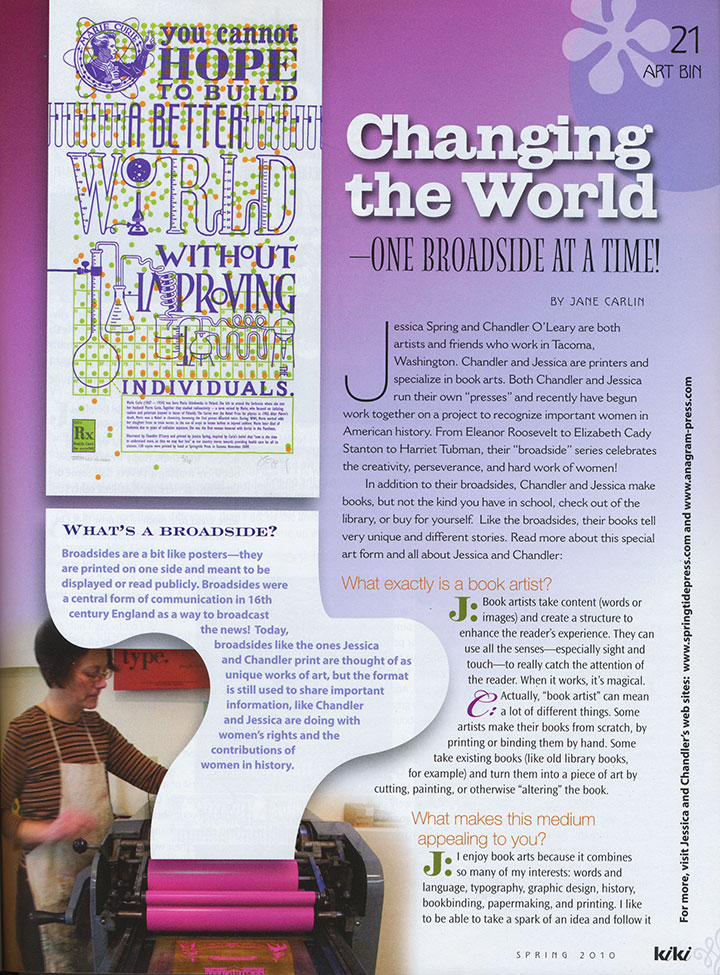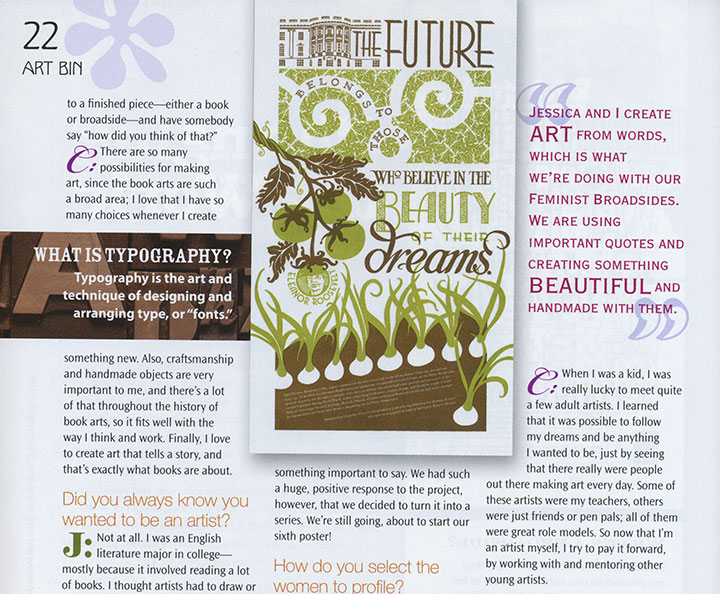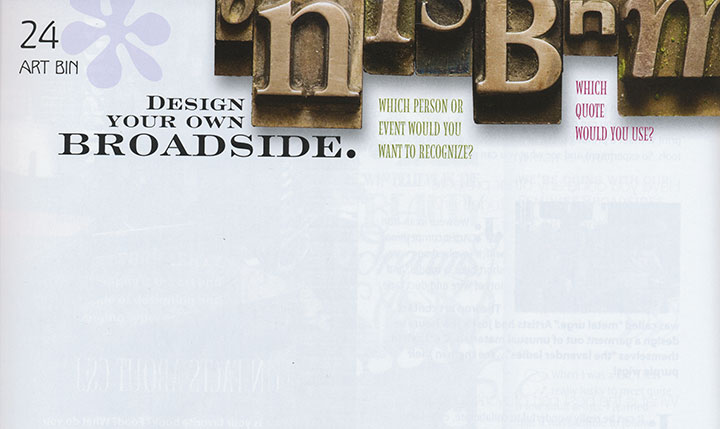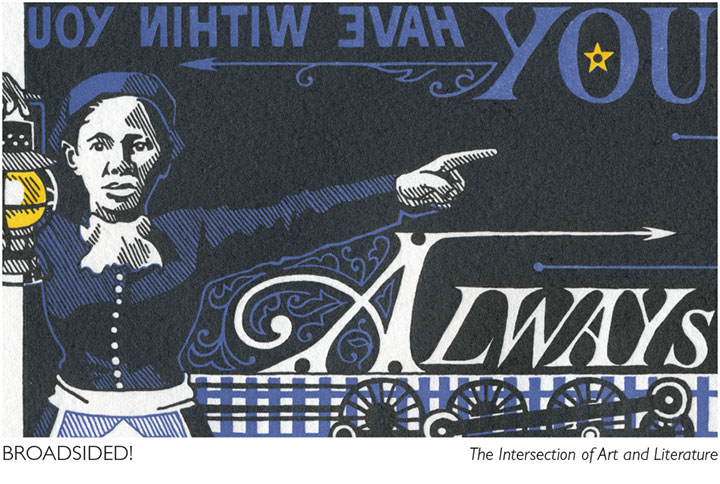It’s hard to ignore the news of protests, ahem, occupying the attention of cities around the world—of the many and diverse thousands of people unified under one simple, yet infinitely faceted mantra. As members of the, well, vast majority of folks without any real political or financial clout in the world, Jessica and I can get behind their message—but that’s not so much the point. What really amazes us is that with a little tenacity and strength in numbers, the powerless can suddenly become very powerful, indeed.
It made us think of a woman who, despite having a famous sibling, would have disappeared into obscurity but for the simple act of picking up a pen.
My power was allways small tho my will is good. —Jane Mecom
Jane’s eminent brother, on the other hand, had a little more faith:
Energy and persistence conquer all things. —Benjamin Franklin
Jane had both energy and persistence in spades—although we marvel at how she managed it, with twelve kids, a family business and a house perpetually full of boarders to occupy her attention. Yet of Benjamin’s sixteen siblings, Jane is the only one whose story has survived the 200+ years since her death—and all because she committed her thoughts to paper. So in honor of Ben and Jane’s relationship, and in solidarity with those who find the strength to speak up, we present our first dual Dead Feminist broadside, Signed, Sealed, Soapbox.
Since this is also our first print that features a cameo from a male Dead Feminist (nope, you don’t have to be female to be a feminist), we thought it deserved a little something extra. So we set it up like a conversation—or in this case, a written correspondence. Besides, there was just so much historical ground to cover—even condensing the information to a blog post is a challenge, let alone plucking two sentences from a lifetime of dialogue. (If you haven’t already guessed, this post is a long one. Grab a cuppa if you dare to settle in!)
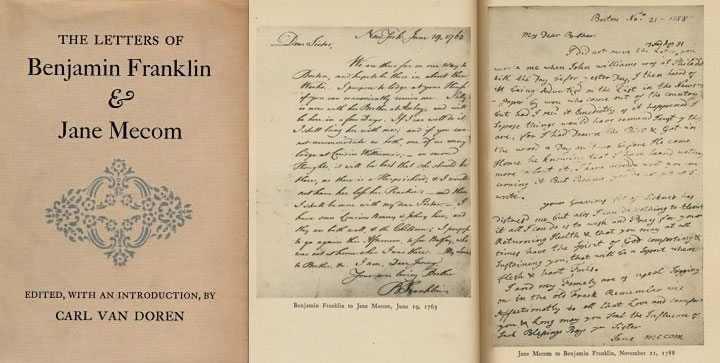
What first sent us down the Jane Mecom rabbit hole was an article about her in the New York Times, written by Jill Lepore. Lepore’s words sent me searching for more information, and I found it buried in the stacks of my local public library. I uncovered an obscure tome: The Letters of Benjamin Franklin and Jane Mecom, by Carl van Doren. The book chronicles their entire surviving correspondence—98 letters in all, printed in full. I was a little worried that the writing style of the day would make even skimming for quotes a chore—but in truth, I couldn’t put it down. It was like peering into the lives of any two ordinary people who happened to care for each other very much. There’s humor, and worried advice, and gossip, and gentle sarcasm, and the occasional scolding (usually on Jane’s part) when one or the other let too much time pass between letters. Most of all, there’s love—it’s there on every page. After all of that, we couldn’t just limit the broadside to a couple of one-liners. So the quotes are accompanied by excerpts from their actual letters, each calligraphed as closely as possible to Ben and Jane’s actual handwriting. Even the spelling errors and colonial-era grammar are intact; we figured it was better not to mess with history.
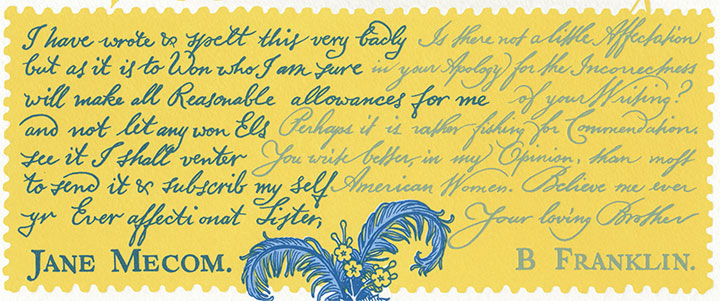
Jane’s excerpted letter:
I have wrote & spelt this very badly but as it is to Won who I am sure will make all Reasonable allowances for me and will not let any won Els see it I shall venter to send it & subscrib my Self yr Ever affectionat Sister, Jane Mecom.
Ben’s reply:
Is there not a little Affectation in your Apology for the Incorrectness of your Writing? Perhaps it is rather fishing for Commendation. You write better, in my Opinion, than most American Women. Believe me ever Your loving Brother, B. Franklin.
There are few Founding Fathers more famous than Ben Franklin, but Jane was somewhat of a mystery. What we do know is that she had a very different life than her illustrious brother. Thanks to the simple fact of having been born female, her youth was spent having babies rather than obtaining an education. Her life was marked with misfortune, poverty and the deaths of nearly everyone she loved. Yet through it all she craved knowledge, and read everything she could get her hands on. She was a skilled craftsperson, making the famed Franklin Crown Soap and teaching the trade to others. And she followed her brother’s career with pride—and he supported her in return, both financially and emotionally.
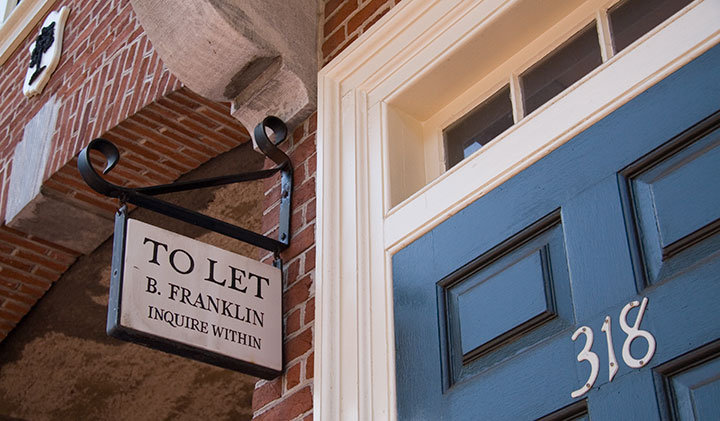
I spent time in both Boston and Philadelphia this summer—ye olde stomping grounds for Doctor Franklin. I had the library book of letters with me on the trip, so their words lent an interesting depth to my wanderings.
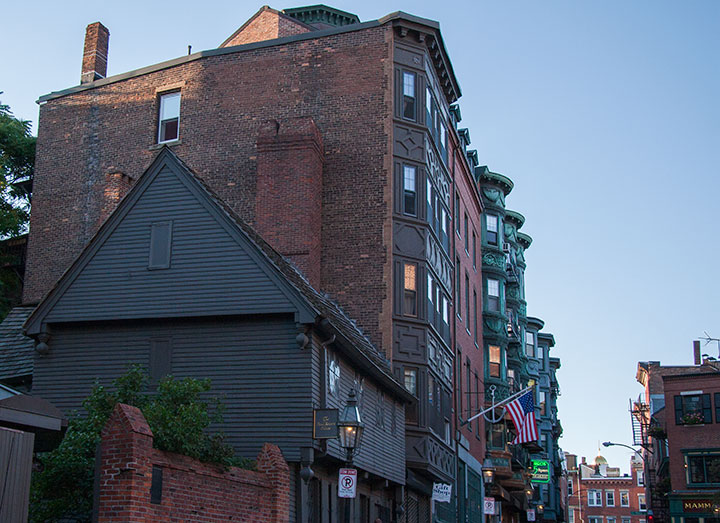
Boston is one of my hometowns, so it was there that I did the most digging. And it turned out that digging was necessary. Ben’s presence is everywhere in Philly, but in Boston, with so many Revolutionary War heroes to honor there, the Franklin family’s presence is far more subtle. And Jane? Well, she’s almost nowhere to be found.
Almost.
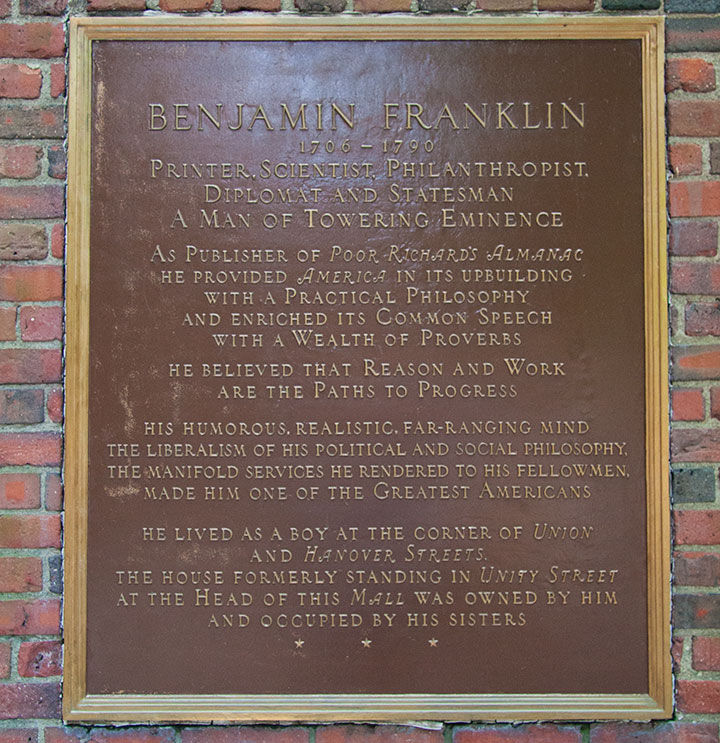
This plaque is all that’s left of the house where Jane spent all her life. It was knocked down to make room for a memorial to Paul Revere. The plaque does mention her briefly, but not by name. Another hazard of being female in the eighteenth century, I suppose.
But Jane lived through the Revolutionary war—in fact, as a resident of the North End, her home was right in the thick of it. In 1775 she fled the British-occupied city and took refuge with friends near Providence, Rhode Island. There, Ben came to rescue her. He took her to Philadelphia, where she spent a year with him before returning to a liberated Boston. While that year was full of turmoil and uncertainty for the citizens of the new United States, 1776 was quite possibly the best year of Jane’s life. For the first time in ages, she could bask in her beloved brother’s company—and he made time for her despite being busy with other things (you know, like founding our country)—and as the honored guest she was largely free from work and family duty.
As far as I can tell, it was also the last time she ever laid eyes on him. Visiting at all was a rare treat—between Ben’s high-profile career and the then-formidable distance between Boston and Philadelphia, it was impossible for them to visit one another more than a handful of times in their entire lives. And since it would have taken weeks for a letter to cross five colonies, and months to traverse the ocean to reach Ben in France, it’s a wonder they remained as close as they did all their lives. Lends a whole new meaning to “snail mail,” doesn’t it?
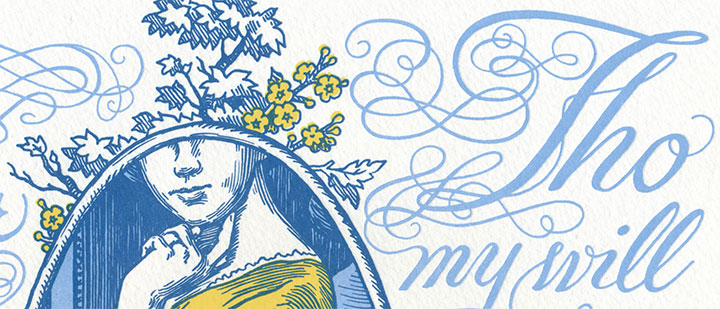
Signed, Sealed, Soapbox is illustrated with the sweeping curves of ornate penmanship and the detailed linework of colonial engravings. A faux-bois forest of branches and flowers resembles the printed toile fabrics of the day. The swoops and swirls of the calligraphy rest in stately Wedgwood blue (complimented by a telltale vase at the bottom!), while Ben and Jane’s correspondence occupies a buttery yellow letter edged like a vintage postage stamp.
And though there is no surviving likeness of Jane Mecom, she deserves so much more than the portrait of a Jane Doe. Instead, she is made in the image of The Comtesse d’Haussonville by French painter Jean-Auguste-Dominique Ingres.
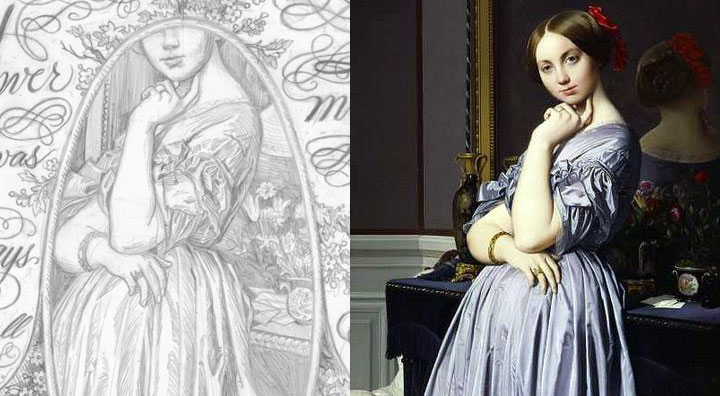
Ben was the best big brother Jane could have asked for. So in honor of his positive influence, we’ll be donating a portion of our proceeds to the Puget Sound chapter of Big Brothers, Big Sisters—an organization dedicated to providing children facing adversity with mentor relationships that change their lives for the better, forever.
• • • • • • • • • • • • • • • • • • • • • • • • • • • • • • • • • • • • • • • • • • • • • • • • • • • • • • • •
Signed, Sealed, Soapbox: No. 14 in the Dead Feminists series
Edition size: 176
Poster size: 10 x 18 inches
Printed on an antique Vandercook Universal One press, on archival, 100% rag (cotton) paper. Each piece is numbered and signed by both artists.
Colophon reads:
Jane (Franklin) Mecom (1712 – 1794) was born in Boston’s North End, the youngest daughter of a soap maker. Married at fifteen, she had no formal education but was a voracious reader of books supplied by her brother. She ran a boarding house and made soap to support her ailing husband, her elderly parents and her twelve children. She outlived all but one of them. Her “Book of Ages” chronicles the deaths of these loved ones, but what little we know of Jane herself can be traced to a lifetime of correspondence with her beloved brother.
Benjamin Franklin (1706 – 1790) attended school for just two years before becoming a printer’s apprentice at age twelve, but was eventually awarded honorary degrees from Harvard, Yale and Oxford. He founded the first lending library in America, reformed the colonial postal system and became the first U.S. Postmaster General. He espoused the values of thrift, hard work, education, community spirit and tolerance, and opposed authoritarianism in both religion and politics.
Despite the differences in their education and circumstances, Benjamin largely treated his sister as an equal, and penned more letters to her than any other person in his life. He sent his writings and political essays to get Jane’s opinion, and notable figures of the day visited her to pay their respects out of deference to the famous Franklin. Benjamin provided decades of financial support for Jane and her children, and upon his death bequeathed her a comfortable living — as well as public trusts to the cities of Boston and Philadelphia to fund mortgages, school scholarships and eventually establish the Franklin Institute of Technology.
Illustrated by Chandler O’Leary and printed by Jessica Spring, 100% occupied with Benjamin’s wise words — and deeds — as he signed the Declaration of Independence: “Yes, we must, indeed, all hang together, or most assuredly we shall all hang separately.”
Now available in the shop!

